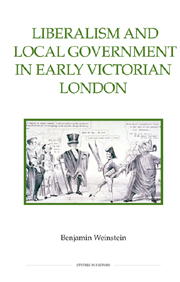Book contents
- Frontmatter
- Contents
- Acknowledgements
- Abbreviations
- Introduction
- 1 Liberal attachments to the unreformed metropolis
- 2 The ‘radicalisation’ of metropolitan political culture, 1832–1841
- 3 The polarisation of metropolitan political culture, 1842–1855
- 4 Redefining the state, I: Rates and taxes, 1834–1853
- 5 Redefining the state, II: The London government problem
- 6 Marylebone in 1854: from conflict to compromise
- Conclusion
- Bibliography
- Index
4 - Redefining the state, I: Rates and taxes, 1834–1853
Published online by Cambridge University Press: 12 September 2012
- Frontmatter
- Contents
- Acknowledgements
- Abbreviations
- Introduction
- 1 Liberal attachments to the unreformed metropolis
- 2 The ‘radicalisation’ of metropolitan political culture, 1832–1841
- 3 The polarisation of metropolitan political culture, 1842–1855
- 4 Redefining the state, I: Rates and taxes, 1834–1853
- 5 Redefining the state, II: The London government problem
- 6 Marylebone in 1854: from conflict to compromise
- Conclusion
- Bibliography
- Index
Summary
Few grievances mobilised the metropolitan radical opposition to Whiggery quite like the church rates and assessed taxes. It was Whig prevarication over the window tax, it will be remembered, that ultimately cost J. C. Hobhouse the support of Place's Westminster Committee and his Westminster seat to boot. The assessed taxes fell heavily on Londoners and there was no shortage of commentary from the metropolitan radical press on London's disproportionate suffering under the house and window taxes in particular. In the House of Commons, the Westminster MP George DeLacy Evans frequently characterised the window tax as a uniquely metropolitan burden. Moreover, like other metropolitan radicals, Evans consistently linked his criticism of both the assessed taxes and the church rate to support for administrative retrenchment and the supposed rights and privileges of ‘local self-government’. This was precisely how Evans framed his opposition to the window tax in 1834, for instance, when he presented to parliament a series of anti-window tax petitions from London's reformed and reforming vestries. As Evans's example suggests, from the mid-1830s metropolitan radical critiques of the assessed taxes and church rate became central to the construction of a broader opposition to Whig centralisation. By 1850 the window tax was frequently invoked by metropolitan radicals alongside the New Poor Law and London's quasi-centralised health authority as institutional proof of Whig debasement of ‘local rights’. At the same time, sustained controversy over the nature of the church rate fuelled an important debate over the legitimate location of the power to set rates, and over the proper role and sphere of central government generally.
- Type
- Chapter
- Information
- Liberalism and Local Government in Early Victorian London , pp. 98 - 115Publisher: Boydell & BrewerPrint publication year: 2011

